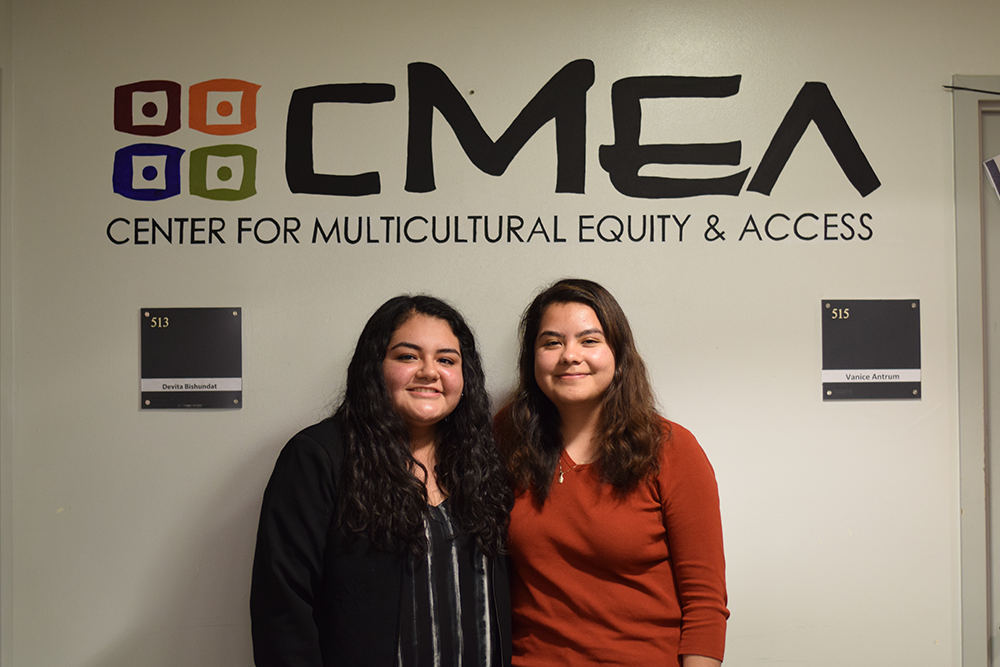Arisaid Gonzalez Porras (COL ’21) and Anahi Figueroa-Flores (COL ’21) are both undocumented women who crossed the U.S.-Mexico border when they were toddlers. Both are low-income, first-generation college students, and neither ever expected to be at Georgetown University.
Gonzalez Porras and Figueroa-Flores met their freshman year in the Community Scholars Program, an initiative organized by the Center for Multicultural Equity and Access to promote diversity and ease the transition of incoming students. Together Gonzalez Porras and Figueroa-Flores manage Hoyas For Immigrant Rights, a student-run advocacy group. Their story continued Jan. 24 when they filed a petition to join the Georgetown University Student Association 2020 Executive election ballot one day before the petition period ended.
After gauging positive interest in their candidacy through Instagram polls on their private accounts, they made the sudden decision to run; however, their motivation for running is clear, Figueroa-Flores said.
“Sometimes you feel like you don’t belong here, but if you see people who look like us be president and vice president, then I think that’s gonna inspire other people to also run for office, like as senators, and they can feel more welcome on campus,” Figueroa-Flores said in an interview with The Hoya.

Gonzalez Porras studies American studies and Figueroa-Flores studies computer science. Georgetown offered a full-ride scholarship to Gonzalez Porras, who is also one of 20 Baker Scholars, a selective Georgetown scholarship program. Both Gonzalez Porras and Figueroa-Flores mentor incoming students of color from low-income backgrounds, aiding them in their transition to Georgetown.
The ticket’s platform is driven by a desire to increase inclusivity and bridge a gaping rift between students and GUSA, according to Figueroa-Flores.
“GUSA has so many resources that students don’t know about, or at least I don’t even know about either, so it would be putting that knowledge for students and making it more accessible and making GUSA more inclusive, and just bridging that gap between students,” Figueroa-Flores said.
Among their primary focuses is an expansion of resources for LGBTQ members of the community, according to Gonzalez Porras.
“There are transgender folks that can still get periods, and they don’t feel comfortable entering the women’s bathroom, so we would want to have something stocked outside, so that none of those decisions don’t have to be made,” Gonzalez Porras said.
Once in power, the pair would also strive to improve mental health services, particularly focusing on the lack of diversity among mental health officers, Figueroa-Flores said.
“It’s unacceptable to have that lack of representation on campus and lack of space for students to heal,” Figueroa-Flores said. “I think expanding those spaces for students and also providing staff that is competent for those spaces, especially for communities of color, is really important.”
Gonzalez Porras and Figueroa-Flores hope to extend their advocacy beyond the student body by celebrating the contributions of campus workers, Gonzalez Porras said.
“When we see the workers here on campus, I see my parents. My parents do these jobs. My mom’s a housecleaning person and my dad sells used merchandise at flea markets and swap meets,” Gonzalez Porras said. “So seeing the workers here sometimes not even be appreciated — I feel so guilty sometimes being at this school. So one of our things would be a workers appreciation week.”
Should their administration encounter resistance from university administration on issues like expanding inclusive student resources, the experienced activists are prepared to pressure the university through strategies ranging from conversation to sit-ins, according to Gonzalez Porras.
“Where the university is now with the LGBTQ Center and having a director for undocumented student services, it hasn’t come out of the goodness of the university — it just hasn’t. It has come because of student activism,” Gonzalez Porras said. “I’m tired of being afraid of institutions in power thinking that they can tell us what to do, but in reality I think the power is in the people.”
If elected, the ticket would measure their success more broadly than with just particular policy achievements, according to Figueroa-Flores.
“Knowing that I helped make a change in a student’s life, knowing that GUSA helped make something happen, if that happens in 100 days — I think that would make me happy,” Figueroa-Flores said.
Gonzalez Porras agreed with her running mate about how they would measure the ticket’s success when in office.
“I would consider myself successful if you could call someone out on campus and be like, ‘Has GUSA reached out to you in any capacity or in any club that you’re in? Do you know that they’ve reached out to you?’ And if they say yes, that to me would be like we did something,” Gonzalez Porras said.
While Gonzalez Porras and Figueroa-Flores are the only candidates with no prior GUSA experience, they are unfazed by this hurdle, according to Gonzalez Porras.
“We’re very new at this; we don’t know how GUSA functions,” Gonzalez Porras said. “We have a lot of the skills and tools, and we’ll figure out how we’re going to do it. So I don’t have a doubt that we’ll figure it out, but we just got to get elected first.”
During their tenure in HFIR leadership, Gonzalez Porras and Figueroa-Flores renewed the club’s activism and organized a walkout advocating for the rights of DACA recipients with over 150 students in November. Current members of GUSA have briefed the candidates on GUSA’s basic functions and structure, according to Figueroa-Flores.
“We’ve already had a couple of meetings with people who are in GUSA, and I think just from hearing them and what they’ve experienced in GUSA, I’ve learned so much already,” Figueroa-Flores said.
In an effort to empower overlooked perspectives, the ticket’s executive team would consist entirely of women of color, according to Gonzalez Porras. The fresh outlook the candidates bring to the GUSA race will rally student voters to their campaign.
“We’re two women; we’re Latinas; we’re undocumented. That already says a lot. I think that we would be making history at Georgetown,” Gonzalez Porras said.




















